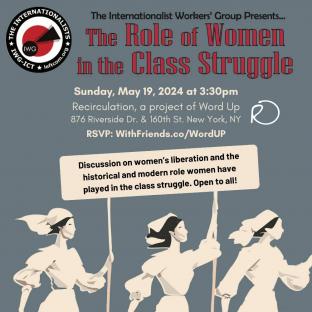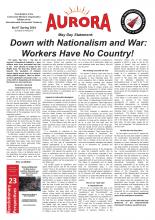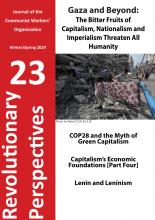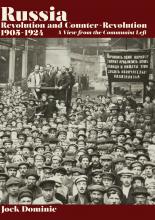May Day, Spring 2024
1917
I have a concern over a pretty fundamental point, one which I have thought about for a while.
The basic positions on which the International Bureau was founded are those established by the International Conferences which ended in the early 1980s. These are:
- acceptance of the October Revolution as proletarian
Now, firstly, are we saying that this means the 1917 experience was fundamentally one which serves as a model to be replicated?
Are we saying that despite flaws it was a genuine attempt at revolution.
Are we saying that all faults arose at a later date and that the October revolution was a solid example of proletarian revolution?
Of course things are complicated by the many volumes written on the subject, and my own limited reading.
However, instinct tells me that the position is not dialectical, not Marxist. there was a conflict between opposing forces, not simply proletariat against bourgeoisie, but within the proletarian camp. I think this is true regarding the perspective on power, the role of the party, the role of the councils, unions etc. This conflict seems to have persisted to this day, with Bordiguists declaring against councilism etc. You may say Bordiguists are an infinitely small number of living fossils, but at the end of the day, so is the rest of the movement (well its small, hopefully we are not fossils!)
I do not think the Bolsheviks were committed to the perspective that we have, regarding substitution etc. I think that the fundamental perspective was one of party dictatorship which was never really relinquished despite recognition of facts on the ground.
In the worst case this possibly means that the October revolution was a battleground where the theoretical uncertainties were tested. However, I have the doubt that our statement is too positive.
Not that 1917 was not important, not that it did not mark progress, a highlight, but that it was not without its blemishes which were not simply the fault of the enemy camp, but central to the theoretical perspectives of the proletarian camp.
Start here...
- Navigating the Basics
- Platform
- For Communism
- Introduction to Our History
- CWO Social Media
- IWG Social Media
- Klasbatalo Social Media
- Italian Communist Left
- Russian Communist Left
The Internationalist Communist Tendency consists of (unsurprisingly!) not-for-profit organisations. We have no so-called “professional revolutionaries”, nor paid officials. Our sole funding comes from the subscriptions and donations of members and supporters. Anyone wishing to donate can now do so safely using the Paypal buttons below.
ICT publications are not copyrighted and we only ask that those who reproduce them acknowledge the original source (author and website leftcom.org). Purchasing any of the publications listed (see catalogue) can be done in two ways:
- By emailing us at uk@leftcom.org, us@leftcom.org or ca@leftcom.org and asking for our banking details
- By donating the cost of the publications required via Paypal using the “Donate” buttons
The CWO also offers subscriptions to Revolutionary Perspectives (3 issues) and Aurora (at least 4 issues):
- UK £15 (€18)
- Europe £20 (€24)
- World £25 (€30, $30)
Take out a supporter’s sub by adding £10 (€12) to each sum. This will give you priority mailings of Aurora and other free pamphlets as they are produced.
ICT sections
Adverts
NYC Public Meeting
THE ROLE OF WOMEN IN THE CLASS STRUGGLE
PUBLIC MEETING AND DISCUSSION
Discussion on women's liberation and the modern role women have played in the class struggle. Open to all!
When: Sunday, May 19th at 3:30 PM.
Where: 876 Riverside Dr. & 160th St. New York, NY.
Link to register: withfriends.co
Internationalist Workers' Group
Recent publications
May 2024
Aurora is the broadsheet of the ICT for the interventions amongst the working class. It is published and distributed in several countries and languages. So far it has been distributed in UK, France, Italy, Canada, USA, Colombia.
March 2024
Mutiny is the bulletin of Klasbatalo. Mutinerie est le bulletin de Klasbatalo.
Out now!
Journal of the Communist Workers’ Organisation -- Why not subscribe to get the articles whilst they are still current and help the struggle for a society free from exploitation, war and misery? Joint subscriptions to Revolutionary Perspectives (3 issues) and Aurora (our agitational bulletin - 4 issues) are £15 in the UK, €24 in Europe and $30 in the rest of the World.
Written by Jock Dominie. £12, 276pp.
The Russian Revolution remains a landmark event in history. For the bourgeois historians, the October Revolution is thought to be a tragedy that set back the achievements of the “democratic” February Revolution, and allowed the Bolsheviks to wreak havoc on their citizens and the world. For the Stalinists, the events of 1917 paved the way for the birth of the USSR, which they point to as a prototypical example of “socialism in one country”. In reality, the February and October Revolutions were both part of the same proletarian revolution.
The book can be ordered by emailing us at uk@leftcom.org and asking for our banking details, or by donating the cost of the publications required via Paypal using the “Donate” button. Postage charges should be added. If in the UK, and paying direct to our bank account, first class postage is free. If via Paypal add £2. For Europe cost of a copy with postage is €20 (EUR), for Australia it is $42 (AUD) and for the USA and anywhere else in the world it is $27 (USD).
User login

This work is licensed under a Creative Commons Attribution 3.0 Unported License.








You have raised an issue
You have raised an issue which we have addressed a few times (but perhaps we need to explain ourselves more). We view the October Revolution as a genuine proletarian revolution but we have said many times that is not a model to be copied. Indeed we take both positive and negative features from it and incorporate them into our platform. What we don't do is, like the anarchists and councilists, deny the whole experience or pretend that there was a revolution which was hijacked by the Bolsheviks. For good or ill the Bolsheviks were a part of the proletariat in 1917 and a creation of its revolutionary impulses. Nor do we argue that the Bolsheviks had a plan to set up a priori a dictatorship of the party (in fact the ditching of the old Bolshevik programme and its replacement with the April Theses left them with a lot of positions that were just blanks (they had no economic programme, for example, for the proletarian revolution esp as they viewed the Oct Rev as only a part of a world revolution which only then would make the realisation of a new mode of production possible). Their biggest weakness of Bolshevism was in the ways in which it had NOT broken with social democracy. For example carrying on the idea of the cabinet government they inherited from the SRS and Mensheviks. Sovnarkom should never have been formed as the All Russian Executive Committee elected by the Second Soviet Congress should have been the "government" This was to undermine the dynamism and accountability of the soviets from day one (but the Bolsheviks were also trying to extend the idea of soviets to more places so it is not a simple argument). Obviously there is much more to be said on this (for example the problem of substitutionism was not foreseen by anyone and only the course of the counter-revolution made it appear obvious) and we can discuss more since any good ideas will have to go into the pamphlet on course of the counter-revolution).
Excellent response.
Excellent response.